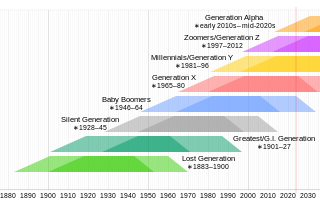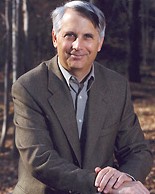
Generation X is the demographic cohort following the Baby Boomers and preceding Millennials. Researchers and popular media often use the mid 1960s as starting birth years and the late 1970s as ending birth years, with the generation being generally defined as people born from 1965 to 1980. By this definition and U.S. Census data, there are 65.2 million Gen Xers in the United States as of 2019. Most of Generation X are the children of the Silent Generation and early Baby Boomers; Xers are also often the parents of Millennials and Generation Z.

Baby boomers, often shortened to boomers, are the demographic cohort following the Silent Generation and preceding Generation X. The generation is often defined as people born from 1946 to 1964 during the mid-20th century baby boom. The dates, the demographic context, and the cultural identifiers may vary by country. Most baby boomers are children of either the Greatest Generation or the Silent Generation, and are often parents of Gen Xers and Millennials.

A teen idol is a celebrity with a large teenage fan base. Teen idols are generally young but are not necessarily teenagers themselves. An idol's popularity may be limited to teens, or may extend to all age groups.

A generation refers to all of the people born and living at about the same time, regarded collectively. It can also be described as, "the average period, generally considered to be about 20–30 years, during which children are born and grow up, become adults, and begin to have children." In kinship terminology, it is a structural term designating the parent-child relationship. It is known as biogenesis, reproduction, or procreation in the biological sciences.

Millennials, also known as Generation Y, are the demographic cohort following Generation X and preceding Generation Z. Researchers and popular media use the early 1980s as starting birth years and the mid-1990s to early 2000s as ending birth years, with the generation typically being defined as people born from 1981 to 1996. Most millennials are the children of baby boomers and older Generation X. In turn millennials are often the parents of Generation Alpha.
A generation gap or generational gap is a difference of opinions and outlooks between one generation and another. These differences may relate to beliefs, politics, language, work, demographics and values. The differences between generations can cause misunderstandings, but it is possible for generations to overcome their differences and maintain functional relationships.
A baby boom is a period marked by a significant increase of births. This demographic phenomenon is usually ascribed within certain geographical bounds of defined national and cultural populations. People born during these periods are often called baby boomers. The cause of baby booms involves various fertility factors. The best-known baby boom occurred in the mid-twentieth century, sometimes considered to have started after the end of the Second World War, sometimes from the late 1940s, and ending in the 1960s.
Generation Jones is the social cohort of the latter half of the baby boomer generation to the first year of Generation X. The term Generation Jones was first coined by the American cultural commentator Jonathan Pontell, who identified the cohort as those born from 1954 to 1965 in the U.S., who were children during Watergate, the oil crisis, and stagflation rather than during the 1950s, but slightly before Gen X.

Shampoo Planet is Douglas Coupland's second novel, published by Pocket Books in 1992. It is a thematic followup to Coupland's first novel, Generation X: Tales for an Accelerated Culture. The novel deals with Tyler, a Global Teen, who shares many characteristics of the character Tyler from Generation X, the younger brother of Andy, Generation X's narrator. The novel tells the story of Tyler's life as he arrives home from Europe, and the fallout of this trip and beyond.

A helicopter parent is a term for a parent who is overattentive and fearful of a child's experiences and problems, particularly outside the home and at educational institutions. It is the opposite of free-range parenting. Helicopter parents are so named because, like helicopters, they "hover overhead", overseeing every aspect of their child's life. A helicopter parent is also known to strictly supervise their children in all aspects of their lives, including in social interactions. Helicopter parents have often been criticized for their perceived paranoia and overinvolvement regarding their children's affairs, even as they reach adulthood.

Generation Z, colloquially known as zoomers, is the demographic cohort succeeding Millennials and preceding Generation Alpha. Researchers and popular media use the mid-to-late 1990s as starting birth years and the early 2010s as ending birth years. Most members of Generation Z are the children of Generation X or younger baby boomers.

Douglas Coupland is a Canadian novelist, designer, and visual artist. His first novel, the 1991 international bestseller Generation X: Tales for an Accelerated Culture, popularized the terms Generation X and McJob. He has published 13 novels, two collections of short stories, seven non-fiction books, and a number of dramatic works and screenplays for film and television. He is a columnist for the Financial Times, as well as a frequent contributor to The New York Times, e-flux journal, DIS Magazine, and Vice. His art exhibits include Everywhere Is Anywhere Is Anything Is Everything, which was exhibited at the Vancouver Art Gallery, and the Royal Ontario Museum and the Museum of Contemporary Canadian Art, now the Museum of Contemporary Art Toronto Canada, and Bit Rot at Rotterdam's Witte de With Center for Contemporary Art, as well as the Villa Stuck.
The "Me" generation is a term referring to Baby Boomers in the United States and the self-involved qualities associated with this generation. The 1970s was dubbed the "Me decade" by writer Tom Wolfe; Christopher Lasch wrote about the rise of a culture of narcissism among younger Baby Boomers. The phrase became popular at a time when "self-realization" and "self-fulfillment" were becoming cultural aspirations to which young people supposedly ascribed higher importance than social responsibility.

Generation X: Tales for an Accelerated Culture is the first novel by Douglas Coupland, published by St. Martin's Press in 1991. The novel, which popularized the term Generation X, is a framed narrative in which a group of youths exchange heartfelt stories about themselves and fantastical stories of their creation.
The Strauss–Howe generational theory, devised by William Strauss and Neil Howe, describes a theorized recurring generation cycle in American history and Western history. According to the theory, historical events are associated with recurring generational personas (archetypes). Each generational persona unleashes a new era lasting around 20–25 years, in which a new social, political, and economic climate (mood) exists. They are part of a larger cyclical "saeculum". The theory states that a crisis recurs in American history after every saeculum, which is followed by a recovery (high). During this recovery, institutions and communitarian values are strong. Ultimately, succeeding generational archetypes attack and weaken institutions in the name of autonomy and individualism, which eventually creates a tumultuous political environment that ripens conditions for another crisis.

William Strauss was an American author, playwright, theater director, and lecturer. As an author, he is known for his work with Neil Howe on social generations and for Strauss–Howe generational theory. He is also known as the co-founder and director of the satirical musical theater group the Capitol Steps, and as the co-founder of the Cappies, a critics and awards program for high school theater students.
The working environment has gone through a major transformation over the last decades, particularly in terms of population in the workforce. The generations dominating the workforce in 2023 are baby boomers, Generation X, millennials and Generation Z. The coming decades will see further changes with emergence of newer generations, and slower removal of older generations from organisations as pension age is pushed out. Many reports, including a publication by Therese Kinal and Olga Hypponen of Unleash, warn that understanding differences between the generations, and learning to adapt their management practices is critical to building a successful multigenerational workplace.

Generation Z, colloquially known as Zoomers, is the demographic cohort succeeding Millennials and preceding Generation Alpha.
"OK boomer" or "okay boomer" is a catchphrase and internet meme that has been used by members of the Millennial generation and Generation Z to dismiss or mock attitudes typically associated with baby boomers – people born in the two decades following World War II. The phrase first drew widespread attention due to a November 2019 TikTok video in response to an older man, though the phrase had been coined years before that. Considered by some to be ageist, the phrase has developed into a retort for resistance to technological change, climate change denial, marginalization of members of minority groups, or opposition to younger generations' values.

Zillennials is the demographic cohort on the cusp of the millennial and Generation Z cohorts. Their adjacency between the two generations and limited age grade has led to their characterization as a "micro-generation." They are generally the children of the members of Generation Jones and Generation X. Estimates of the U.S. population in this cohort range from 30 million to 48 million.

























